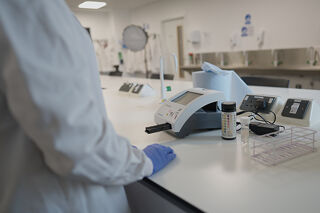If you’re thinking about studying a science degree but aren’t sure which one to choose, you’re not alone!
In this blog, we’ll break down the key differences between Biomedical Science and Human Biosciences. Both degrees explore how the human body works, and what happens when things go wrong, but each opens doors to very different career paths.
Biomedical Science
For students aiming for a clinical science career.
If your goal is to work in a hospital laboratory in a clinical diagnostic setting, Biomedical Science could be the right choice for you.
Key features:
-
IBMS Accredited: This degree is accredited by the Institute of Biomedical Science (IBMS), meaning it fulfils the academic standards needed to become a registered Biomedical Scientist. As a Biomedical Science graduate you would have the option of progressing into trainee Biomedical Scientist roles and complete the on-the-job practical training required to become a Health and Care Professions Council (HCPC) registered Biomedical Scientist.
-
Structured and specialised: Because of the accreditation, the course course includes a range of practical laboratory and professional skills that are in demand across the industry.
-
Clinical focus: You’ll develop the practical and theoretical skills required to work directly in healthcare science, supporting disease diagnosis and medical research.
Human Biosciences
For students who want flexibility and variety.
If you’re passionate about human biology but want a degree with more choice and variety, Human Biosciences might be the perfect fit.
Key features:
-
Broader career opportunities: A great option if you’re considering postgraduate medicine, research, public health, or nutrition. It also offers wide possibilities within the biotechnology and life sciences industries.
- Graduate entry pathways: Human Biosciences students can also apply for graduate medicine programmes, the NHS scientist training programme, as well as a range of other postgraduate opportunities in healthcare, science and research.
-
Flexible curriculum: Offers optional and adaptable modules that evolve with the latest developments in the health and science sectors.
-
Placement year available: Gain valuable industry experience and explore different career paths through a placement year.
-
Diverse content: Topics can include areas such as nutrition, science communication, biomaterials, and pharmacology and toxicology.
So which one’s for you?
Both degrees share a fascination with the science of life and human health. The difference lies in how structured or flexible you want your journey to be:
-
Choose Biomedical Science if you’re aiming for a clinical laboratory career and want a course that’s professionally accredited and tailored to that path.
-
Choose Human Biosciences if you want broader scientific foundations, more freedom to tailor your studies to your interests, and a variety of career options after graduation.
Whichever you choose, you'll be part of a community of scientists exploring how to improve health, understand disease, and make a real difference to people's lives.


